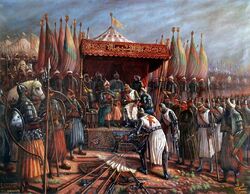An-Nāṣir Ṣalāḥ ad-Dīn Yūsuf ibn Ayyūb (Arabic: الناصر صلاح الدين يوسف بن أيوب; c. 1138 – 1193), better known to Europeans simply as Saladin or alternatively anglicized as Salah Al'din,[1] was a Sultan of the Ayyubid dynasty of Egypt and Syria during the late 12th century.
He was also the commander of the Muslim armies united against the invading armies of Europe, under Richard the Lionheart during the Third Crusade, and was known for his cunning tactics, fighting skill in battle, chivalry, and tolerance.
Biography[]
Siege of Masyaf[]
In 1176, Saladin's forces laid siege to Masyaf, headquarters of the Levantine Brotherhood of Assassins, following several assassination attempts on him. Quickly taking control of Masyaf's village, the Saracen forces set up camp near the fortress.[1]
For further protection, the Saracens set up a fake tent for the Sultan in the middle of the camp to fool the Levantine Assassins. However, an Assassin spy by the name of Ahmad Sofian had infiltrated the Saracen forces, and was able to inform the Levantine Assassins of the location of the Sultan's real tent.[1]
Following this, Saladin's tent was infiltrated by the Assassin Umar Ibn-La'Ahad soon afterwards. Umar left a note attached to Saladin's pallet while he was asleep, however, the Sultan woke up before he could leave, and summoned his guards. Umar managed to escape the tent, but was forced to kill a noble in the process.[1]
Saladin left the battlefield temporarily, and sent his uncle Shihab Al'din to form a truce with the Levantine Assassins, with the Saracens desiring the life of Umar in exchange for the captured Ahmad Sofian and the safety of Masyaf. True to their word, once the terms of the truce were accepted and Umar executed, the Saracens left Masyaf.[1]
By 1187, Saladin consolidated a large amount of power in Syria and Egypt. That year, he was proclaimed Sultan and amassed a powerful army to lead a series across of conquests across the Holy Land.[2]
Third Crusade[]

Saladin and Guy of Lusignan after the Battle of Hattin
At the beginning of the Third Crusade, Saladin and his men defeated Guy of Lusignan – the King of Jerusalem, who would later ally with King Richard in the siege of Acre – and Raynald of Châtillon at the Battle of Hattin, where he destroyed the entire army of the Kingdom of Jerusalem.[3]
Following this tremendous victory, Saladin moved on to secure most of the cities and fortresses of the Kingdom of Jerusalem, until finally conquering Jerusalem itself that same year.[2] Following the arrival of King Richard, Saladin moved to fight against him, and their conflict emerged to follow the pattern of Richard taking ground in the Holy Land, before Saladin immediately re-took any and all ground claimed by King Richard.[4]
In 1191, Saladin lost the city of Acre to a siege by the combined Crusader armies of Richard, Leopold V of Austria and Philip II of France. In an attempt to recoup his loses, Saladin led an assault on the port city of Arsuf while Richard's army was making a move on Jaffa. However, the Crusaders held firmed and launched a counterattack which routed Saladin's troops.[2]
Eventually, King Richard saw it fit to finally give up his ambitions towards conquering Jerusalem after losing many battles, resources, and support for his crusade.[4] Abandoned by his German and French allies, Richard accepted a peace treaty offered earlier by Saladin in 1192, which allowed Christians to visit Jerusalem for Pilgrimage unharmed and unmolested.[2]
Later life and death[]
Saladin died on 4 March 1193, and was buried at the Umayyad Mosque, in Damascus. [citation needed]
Gallery[]
Behind the scenes[]
Saladin is Anglicization of the Arabic name صلاح الدين (Salāḥ al-Dīn), meaning "Righteousness of Religion/Faith". He acquired the title after expressing his early intentions for conquering Jerusalem to his mentor, Imad ad-Din Zengi, another Muslim conqueror. In the 12th century, the Crusaders used the European pronunciation of Sala-din while the Saracens used the Arabic pronunciation of Salāḥ ad-Dīn. The latter is the pronunciation used throughout Assassin's Creed by the Saracens, but it is never transcribed in writing. On the other hand, the 2011 novel Assassin's Creed: The Secret Crusade renders his name as Salah Al'din.
Appearances[]
- Assassin's Creed (mentioned only)
- Assassin's Creed: The Secret Crusade (first appearance)
- Assassin's Creed: Initiates (mentioned only)
- Assassin's Creed: Memories (mentioned only)
References[]
- ↑ 1.0 1.1 1.2 1.3 1.4 Assassin's Creed: The Secret Crusade
- ↑ 2.0 2.1 2.2 2.3 Assassin's Creed: A Walk Through History (1189-1868) – Chapter 1: The Third Crusade
- ↑ Assassin's Creed: Initiates – Database: The Horns of Hattin
- ↑ 4.0 4.1
Saladin on Wikipedia
| ||||||||||||||||||||||||||||

